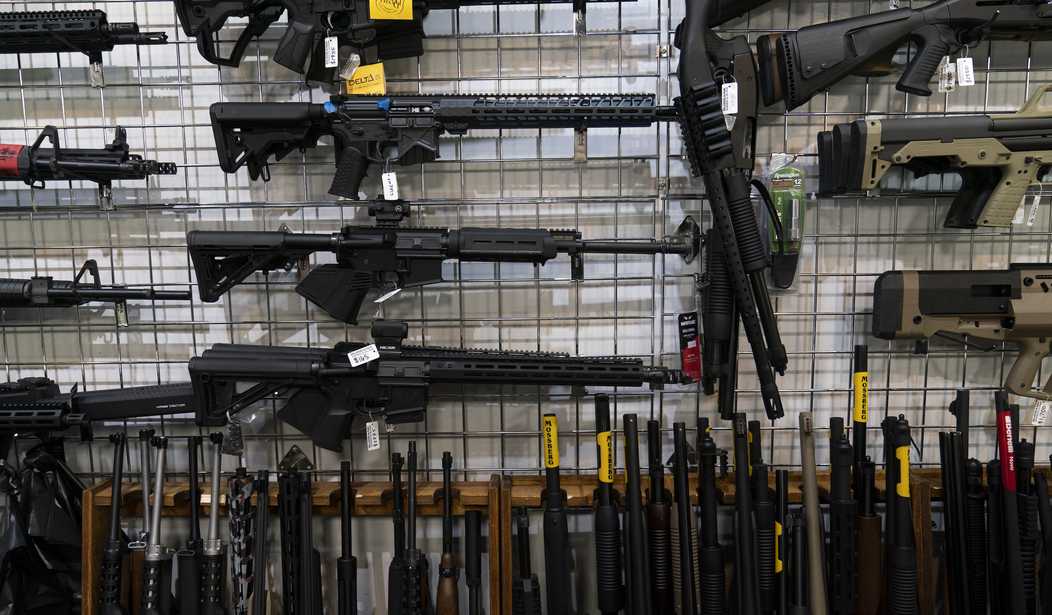Last month, a federal judge ruled that New Jersey's ban on AR-15 rifles is unconstitutional. A week later, a federal appeals court deemed a similar ban in Maryland perfectly consistent with the Second Amendment.
These dueling decisions reflect a basic disagreement about whether the Second Amendment allows the government to ban guns that are commonly used for lawful purposes, as opposed to "dangerous and unusual weapons." The answer seems clear based on the Supreme Court's precedents.
The court's landmark 2008 decision in District of Columbia v. Heller, which overturned a local handgun ban, noted "the historical tradition of prohibiting the carrying of 'dangerous and unusual weapons,'" which it said did not encompass firearms "in common use" for "lawful purposes like self-defense." Since handguns are "the quintessential self-defense weapon," it said, the fact that they are also commonly used by criminals could not justify prohibiting law-abiding Americans from owning them.
The court's 2022 decision in New York State Rifle & Pistol Association v. Bruen reiterated that point. "Whatever the likelihood that handguns were considered 'dangerous and unusual' during the colonial period, they are indisputably in 'common use' for self-defense today," it said. Colonial laws that "prohibited the carrying of handguns," the court concluded, "provide no justification for laws restricting the public carry of weapons that are unquestionably in common use today."
AR-15s likewise are "unquestionably in common use today." Since 1990, more than 28 million "modern sporting rifles" have been sold in the United States, and as many as 24 million Americans have owned AR-15s or similar rifles for lawful purposes such as self-defense, hunting and recreational target shooting.
Recommended
Like the law at issue in Heller, U.S. District Judge Peter Sheridan noted last month, New Jersey's AR-15 ban amounts to "the total prohibition (of) a commonly used firearm for self-defense ... within the home." And under Heller, "a categorical ban on a class of weapons commonly used for self-defense is unlawful."
Sheridan highlighted testimony showing that "AR-15s are well-adapted for self-defense." When it upheld Maryland's AR-15 ban last week, by contrast, the U.S. Court of Appeals for the 4th Circuit declared that such rifles are "ill-suited and disproportionate to the need for self-defense."
That conclusion, Judge Julius Richardson noted in a dissent joined by four of his colleagues, ignored the self-defense advantages of AR-15s, including better accuracy, greater recoil absorption and more stopping power than handguns. While handguns also have certain advantages, Richardson said, the appeals court had no business second-guessing gun owners' weighing of these rifles' pros and cons, thereby "replac[ing] Americans' opinions of their utility with its own."
Where Richardson sees self-defense advantages, the majority sees features that make AR-15s especially deadly in mass shootings. These clashing perspectives illustrate the folly of trying to draw a legal distinction between guns that are suitable for legitimate purposes and guns that supposedly are good for nothing but killing innocent people.
The 4th Circuit's opinion is long on detailed descriptions of such horrifying crimes but short on the sort of analysis required by Bruen, which said gun control laws must be "consistent with this Nation's historical tradition of firearm regulation." And the appeals court's discussion of mass shootings features several familiar distortions.
The 4th Circuit calls AR-15s the "weapons of choice" for mass shootings, even while noting that most mass shooters choose other kinds of guns. It emphasizes their military lineage, which Richardson notes is common for civilian firearms, and their destructive power, which is shared by many rifles that Maryland did not ban.
The appeals court never acknowledges that mass shootings account for a tiny percentage of gun homicides or that handguns play a much bigger role in murders than any sort of rifle. It therefore never squarely confronts the point that the Supreme Court made in Heller: that criminal use of guns does not negate the right of law-abiding Americans to own them. It looks like the justices will have to remind the lower courts of that principle.

























Join the conversation as a VIP Member